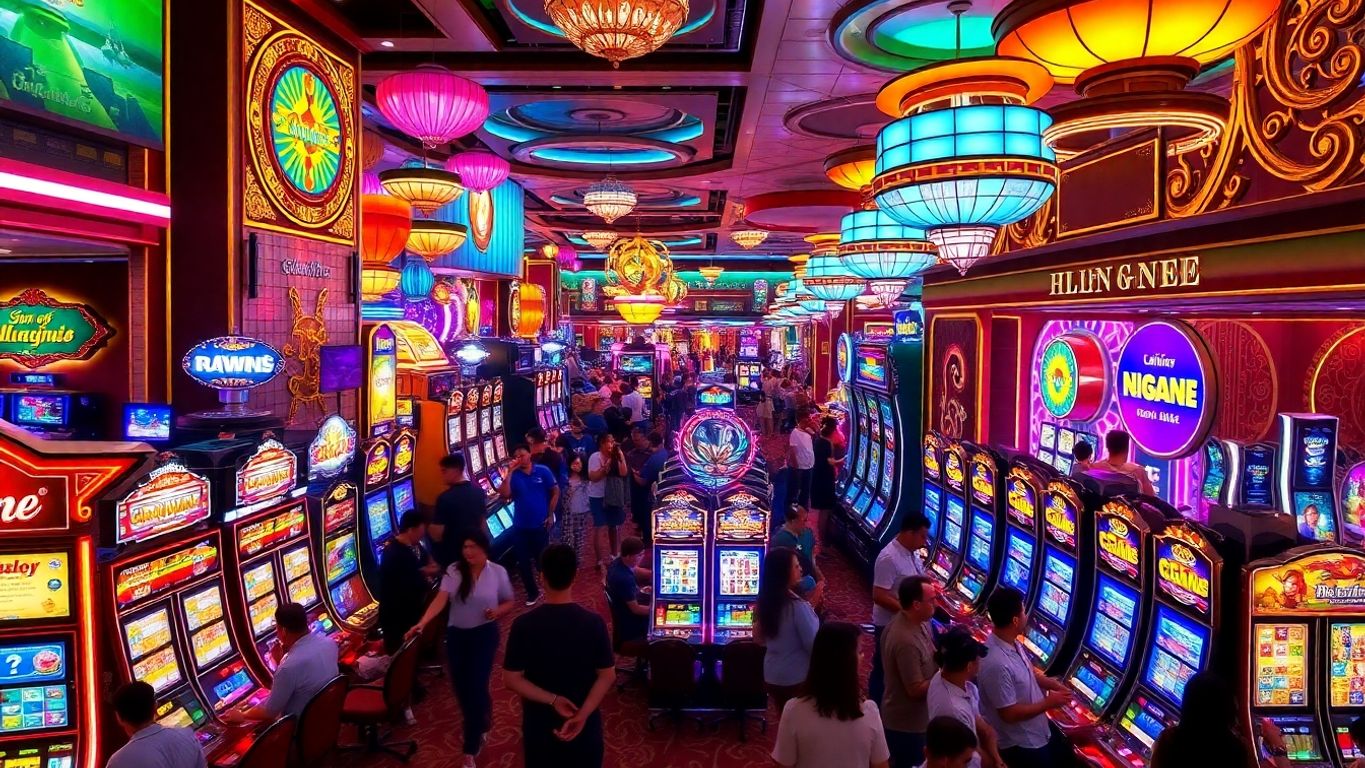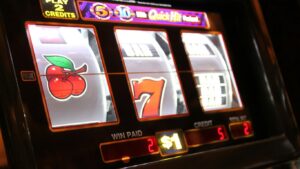The Rise Of Asia Gaming Casino Markets
The gaming casino scene in Asia is on fire, with some serious growth happening. Technavio predicts the global casino gaming market to expand by USD 43.3 billion from 2024 to 2028, with a hefty 36% of this growth coming from the Asia-Pacific region source. That’s a massive chunk, showing just how important this region is becoming in the global scene. The demand for gaming is skyrocketing, fueled by increasing disposable incomes and a growing acceptance of gambling as a form of entertainment. Countries like China, the Philippines, and Singapore are leading the charge, with each contributing uniquely to the market’s expansion.
When it comes to big names in the Asian casino market, you’re looking at giants like Las Vegas Sands Corporation, MGM Resorts International, and Genting Group. These companies are not just playing in the market; they’re shaping it. They’ve established major operations in key locations such as Macau and Singapore, tapping into the lucrative opportunities these regions offer. Local operators in countries like the Philippines are also making waves, with establishments like Casino Filipino becoming household names.
Technology is a game-changer for the casino industry in Asia. The rise of online gaming platforms is opening new doors, allowing players to enjoy casino games from the comfort of their homes. This shift is not just about convenience; it’s about reaching a wider audience who might not visit a physical casino. Emerging technologies like virtual reality and blockchain are also beginning to find their place in the industry, promising to enhance the gaming experience and increase transparency and security in transactions. As these technologies evolve, they will undoubtedly play a pivotal role in the future of the Asian gaming market.
Macau: The Gaming Capital Of Asia
Overview Of Macau’s Casino Scene
Macau is often dubbed the "Las Vegas of Asia," and for good reason. It’s the only place in China where casino gambling is legal, making it a unique and vibrant hub for gaming enthusiasts. The city is home to some of the world’s most luxurious casinos, drawing in millions of tourists annually. Macau’s gaming industry is a major economic pillar, contributing significantly to its GDP. The city’s skyline is dominated by towering casino resorts, each offering a unique blend of entertainment, dining, and, of course, gaming.
High-Roller Attractions
Macau’s casinos are a magnet for high-rollers from around the globe. These establishments offer exclusive VIP rooms and high-stakes tables that cater to the wealthiest gamblers. The allure of Macau isn’t just in the games; it’s in the opulence and exclusivity that these casinos provide. From private jet services to luxurious accommodations, high-rollers are treated to an experience that combines luxury and excitement. This high-stakes environment is what sets Macau apart from other gaming destinations.
Regulatory Environment
The regulatory framework in Macau is designed to maintain its reputation as a premier gaming destination while ensuring fair play and transparency. The government closely monitors casino operations, ensuring they adhere to strict guidelines to prevent illegal activities. This regulatory oversight is crucial for maintaining investor confidence and protecting the interests of both players and operators. As Macau continues to evolve, its regulatory environment adapts to new challenges, balancing growth with responsible gaming practices. This approach has been key to sustaining Macau’s position as a leading player in the global gaming industry.
Philippines: A Thriving Casino Destination
Economic Impact Of Casinos
The casino industry in the Philippines is booming, making it a top destination for gaming enthusiasts. With the Philippine gambling industry expected to hit a record revenue of over 350 billion pesos this year, the economic impact is undeniable. Casinos contribute significantly to the local economy, providing jobs and boosting tourism. This growth is not just a stroke of luck; it’s the result of strategic investments and a welcoming regulatory environment.
Popular Casino Resorts
The Philippines boasts a variety of world-class casino resorts that attract visitors from around the globe. Some of the most famous ones include:
- Resorts World Manila: Known for its luxurious accommodations and vibrant gaming floors.
- Okada Manila: Offers a lavish experience with its massive casino and entertainment options.
- City of Dreams Manila: A hub for both gaming and entertainment, featuring top-notch restaurants and shows.
- Solaire Resort & Casino: Famous for its stunning views and high-end gaming experience.
These resorts not only provide gaming opportunities but also enhance the country’s reputation as a top-tier travel destination.
Future Growth Projections
Looking ahead, the future of the casino industry in the Philippines seems bright. The market is anticipated to expand further, with more integrated resorts and gaming facilities in the pipeline. The government’s supportive stance on casino development continues to attract international investors, promising even more growth in the coming years. With such promising prospects, the Philippines is set to strengthen its position as a leading casino hub in Asia.
Japan: The Emerging Casino Landscape
Legalization Of Integrated Resorts
Japan’s journey into the casino world is taking shape with the endorsement of its first casino resort in April 2023. This marks a significant shift in the country’s approach to gambling, as it plans to integrate these resorts into larger complexes. The aim is to boost tourism and invigorate local economies. The government has established the Japan Casino Regulatory Commission to oversee this new industry, ensuring that operations align with national interests and regulations. This move is expected to transform Japan into a key player in the global gambling scene.
Expected Economic Benefits
The introduction of integrated resorts is anticipated to have a substantial impact on Japan’s economy. These developments are projected to attract millions of tourists annually, contributing significantly to the hospitality and service sectors. Moreover, the influx of international visitors is expected to create numerous job opportunities, ranging from construction to hotel management. The economic ripple effect is likely to extend to local businesses, boosting sales and encouraging further investments in the region.
Cultural Attitudes Towards Gambling
In Japan, gambling has traditionally been viewed with skepticism, largely due to cultural and historical factors. However, attitudes are gradually shifting as the government promotes casinos as part of broader entertainment complexes. This change is partly driven by the younger generation, who are more open to gambling as a form of leisure. Despite this shift, there remains a strong emphasis on responsible gambling practices to ensure that the social fabric is not adversely affected. The challenge lies in balancing economic benefits with cultural sensitivities, a task that Japan seems ready to tackle as it enters this new era of gaming.
South Korea: Navigating Strict Regulations
Overview Of Gambling Laws
South Korea’s gambling scene is tightly controlled, with strict laws in place to regulate the industry. Only foreigners are allowed to gamble in the country’s casinos, while locals face heavy restrictions. The government’s firm stance is evident in the legal framework, which imposes severe penalties for illegal gambling activities. Online gambling is completely banned, adding another layer of control over the market. Despite these constraints, the gambling industry in South Korea continues to attract international interest, largely due to its appeal to foreign tourists.
Foreign Tourist Casinos
Casinos in South Korea primarily cater to foreign tourists, with 17 out of 18 casinos open exclusively to them. These establishments offer a wide range of games, from slot machines to table games, designed to attract visitors from around the globe. The only casino that allows local participation is Kangwon Land, located in a remote area, which serves as an exception to the rule. This limited access for locals underscores the government’s intent to keep gambling activities under tight control while still benefiting from international tourism.
Market Potential Despite Restrictions
Even with stringent regulations, the South Korean gambling market holds significant potential. The country’s casinos are strategically positioned to attract tourists from neighboring countries, contributing to the local economy. However, the rise of illegal online gambling presents a challenge to the authorities. Between 2019 and 2023, illegal online gambling surged threefold, with online activities representing 80% of all illegal bets. This trend is particularly concerning among young people, highlighting the need for effective enforcement and potential regulatory adjustments to address these issues.
India: A Dynamic Gaming Frontier
Growth Drivers In The Indian Market
India’s gaming market is really taking off, and it’s not hard to see why. Digital adoption is skyrocketing with more people getting online every day. This digital boom is opening up tons of opportunities for online gambling platforms. Plus, there’s a huge young crowd in India that’s super into tech and looking for new, exciting gaming experiences. Then there’s the cultural side of things. Gambling is kind of a big deal during festivals like Diwali, which makes it feel normal and fun for a lot of people.
Regulatory Challenges
But, it’s not all smooth sailing. The rules around gambling in India are pretty tricky. Different states have their own laws, which can be confusing. Some places are okay with it, while others aren’t. This patchwork of regulations makes it tough for operators to know what’s legal and what’s not. And let’s not forget about the constant debates over whether gambling should be more regulated or even allowed at all.
Future Market Projections
Looking ahead, the future of India’s gaming market seems bright. Estimates suggest that by 2028, the market could be worth between $8-10 billion annually. This growth is likely driven by more people getting online, a growing middle class with disposable income, and perhaps a shift in how gambling is viewed legally. As the market expands, we’ll probably see more top casinos in India popping up, offering a mix of traditional and online gaming options. This could make India one of the biggest gaming markets in the world.
Singapore: Controlled Liberalization In Gambling
Casino Licensing Framework
Singapore has a unique approach to gambling that’s all about balance. The government allows some gambling but with strict rules to keep things in check. There are only two casinos in the whole country—Marina Bay Sands and Resorts World Sentosa. These places have special licenses, and the government keeps a close eye on them to make sure they don’t cause too many problems for society. To get in, locals have to pay a fee, which is meant to stop people from gambling too much.
Online Gambling Regulations
When it comes to online gambling, Singapore is pretty strict. Most of it is banned, but the government does allow some betting through state-run groups like Singapore Pools and the Singapore Turf Club. They control things like lotteries and horse racing. If people try to gamble online illegally, they can face big fines or even jail time. Still, some folks use tricks like VPNs to gamble on foreign sites, which makes it hard for the government to enforce the rules.
Tourism And Economic Contributions
Even with all these rules, Singapore’s casinos are a big draw for tourists. The high-quality casinos bring in people from all over, which helps boost the economy. There’s always a debate about whether the benefits outweigh the social risks, especially with online gambling. But for now, the casinos are a big part of Singapore’s tourism strategy. The government keeps looking for ways to balance the good and the bad of gambling, and they’re always tweaking the rules to make sure things stay on track.
Vietnam: Gradual Opening Of The Casino Market
Current Gambling Regulations
Vietnam’s gambling landscape has undergone significant changes over the past few years. Once a country with stringent gambling bans, Vietnam is now gradually easing restrictions. Foreign passport holders are allowed to gamble in the country’s casinos, a move that has opened the doors to more international visitors. Furthermore, a pilot program launched in 2017 allows locals to participate in gambling at selected venues, marking a significant shift in policy.
Future Prospects For Local Participation
The pilot project for local participation is a key step in Vietnam’s strategy to expand its casino industry. If successful, this initiative could lead to broader access for Vietnamese citizens, potentially increasing the domestic market size. There’s a growing anticipation that Vietnam might fully open its casino doors to local players, which could significantly boost its gaming revenue. This change is expected to attract more investment and development in integrated casino resorts, further enhancing the country’s appeal as a gaming destination.
Impact On Tourism
The gradual opening of Vietnam’s casino market has already begun to impact tourism positively. With casinos becoming more accessible, the country is seeing a rise in international tourists seeking gaming entertainment. This trend is expected to continue, contributing to Vietnam’s economic growth. In fact, Vietnam’s casino gaming revenue is experiencing a steady annual growth rate of 12 to 15%, fueled by the increasing popularity of integrated casino resorts. This growth not only boosts the tourism sector but also supports local businesses and creates new job opportunities.
Malaysia: Balancing Tradition And Gaming
Cultural Attitudes Towards Gambling
Malaysia’s cultural landscape is deeply influenced by its diverse population, comprising primarily Malay, Chinese, and Indian communities. Gambling, while popular among certain groups, is largely frowned upon due to religious beliefs, especially in the Islamic Malay community. This cultural backdrop creates a complex environment where gambling is both embraced and restricted, depending on the community. Despite these challenges, gambling remains a part of the social fabric for many, particularly during festive occasions and within the Chinese community.
Limited Casino Options
Malaysia’s gambling scene is notably limited, with only a handful of legal casino options available. The most prominent among them is SkyCasino in Genting Highlands, which stands as the largest casino in the region. This casino offers a wide array of games and attracts both locals and tourists alike. However, the stringent regulations and limited number of licenses mean that gambling opportunities remain scarce. This limited availability is both a challenge and a draw, as it creates an exclusive atmosphere that appeals to high rollers.
Economic Contributions Of Gaming
Despite the restrictions, the gaming sector contributes significantly to Malaysia’s economy. The tourism industry benefits greatly, with casinos like those in Genting Highlands drawing visitors from across the globe. The revenue generated supports local businesses and creates employment opportunities, adding to the country’s economic stability. As Malaysia continues to balance its cultural values with economic interests, the gaming industry remains a vital, albeit controversial, component of its financial ecosystem.
Technological Innovations In Asia Gaming Casino
Impact Of Online Gaming Platforms
The online gaming scene in Asia has exploded recently, becoming a major part of the casino industry. With the convenience of playing from home, more people are getting into online gambling. This shift is changing how casinos operate, pushing them to offer more interactive and immersive experiences online. Some platforms even have live dealers, making the experience feel just like being in a real casino. It’s not just about playing games anymore; it’s about creating a whole new experience that keeps players coming back.
Emerging Technologies In Casinos
Casinos in Asia are embracing new tech to stay ahead. One big thing is the use of smart gaming tables, which are expected to significantly boost gross gaming revenue. These tables use RFID technology to track bets and chips automatically, making games faster and more secure. Virtual reality is another exciting area, offering players a chance to step into a fully immersive gaming world. These innovations aren’t just flashy; they’re changing the game by making it more efficient and appealing to tech-savvy players.
Future Trends In Gaming Technology
Looking ahead, several trends are set to shape the future of casino gaming in Asia. Artificial intelligence will likely play a big role, helping casinos personalize experiences for players by analyzing their preferences and behaviors. Blockchain technology might also become more common, offering secure and transparent transactions. As these technologies evolve, they’re expected to make gaming more accessible and engaging, attracting an even broader audience.
Cultural Influences On Asia Gaming Casino Trends
Gambling As A Social Activity
Gambling in many Asian cultures isn’t just about the thrill of winning. It’s deeply woven into the social fabric, often seen as a communal activity. In countries like China and India, gambling during festivals is a tradition, bringing families and friends together. It’s more than just a game; it’s a social event. People gather around tables, sharing stories, laughter, and sometimes even life advice, making the whole experience richer.
Cultural Attitudes Towards Risk
Asian cultures have varied attitudes towards risk, which significantly shape gambling behaviors. In Japan, for instance, there’s a cultural inclination towards precision and calculation, which influences their gaming choices. On the other hand, in places like the Philippines, there’s a more relaxed approach, where the joy of the game often outweighs the concern for loss. Understanding these nuances is key for casinos to cater effectively to their clientele.
Influence Of Local Traditions
Local traditions play a pivotal role in shaping the gaming environment. Casinos are increasingly partnering with local artists to incorporate unique installations and decorative elements that reflect the cultural heritage of their regions. This trend emphasizes thematic inspirations in casino design, enhancing the overall experience for visitors. Whether it’s a dragon dance in Macau or a traditional puppet show in Indonesia, these cultural elements add a layer of authenticity and allure to the gaming experience.
Conclusion
So, there you have it. The Asian casino scene is buzzing with energy and opportunity. From the glitzy lights of Macau to the emerging markets in the Philippines and Japan, there’s something for everyone. Whether you’re a high-roller or just curious, Asia’s gaming world is worth checking out. It’s not just about the games; it’s about the experience, the culture, and the thrill of it all. As the industry keeps growing, who knows what exciting developments are around the corner? One thing’s for sure, the Asian gaming scene is here to stay, and it’s only getting bigger and better.
Frequently Asked Questions
What makes Macau the top gaming destination in Asia?
Macau is famous for its huge casinos and luxury hotels. It’s like the Las Vegas of Asia, attracting many people who love to gamble.
Why is the casino industry growing so fast in Asia?
The industry is growing because more people are interested in gambling, and more countries are allowing casinos to open.
How does technology affect casinos in Asia?
Technology makes it easier for people to gamble online and offers new games with cool features in casinos.
What are integrated resorts in Japan?
Integrated resorts are big places with hotels, casinos, shopping, and entertainment all in one. Japan is starting to build these to attract tourists.
Why are casinos important for the economy in the Philippines?
Casinos bring in a lot of money and create many jobs, which helps the economy grow.
What is the gambling situation in South Korea?
In South Korea, only foreigners can gamble in most casinos. The laws are strict to control gambling.
How is gambling viewed in India?
Gambling is growing in India, but there are still many rules and challenges to deal with.
What role do cultural attitudes play in gambling trends in Asia?
Cultural attitudes influence how people view gambling, with some seeing it as fun and others as risky.









